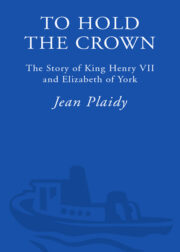“A boy!” she cried. “Healthy enough . . . though small, as to be expected coming a month too soon.”
“A boy,” said the Queen, holding out her arms.
“Just for a few moments, my dear,” said the Countess. “You must not tire yourself. We are going to get you well as soon as we can. That would be the King’s command.”
“Where is the King?”
“He will be here soon. I long to see his face when he hears we have our boy.”
The Queen could see her mother standing there and she smiled at her.
“Dearest lady,” she said.
The Queen Mother was on her knees at the bedside. “We have our boy, my dearest,” she said. “A darling little boy. We must call him Edward after your father. And let us pray that he shall be such another as his grandfather.”
The Queen nodded and looked down at the child. But her mother-in-law was already taking him away.
“The Queen should have the baby for a while,” said Elizabeth Woodville. “He will be such a comfort to her.”
“The Queen is comforted indeed by the knowledge that she has a son. She is exhausted now and it is best for her to sleep.”
The Countess signed to the nurse. “Take the child now.” As the nurse did so she said, “I hear sounds of arrival. The King is here.”
She hurried out of the chamber and went to greet him. She wanted to be the first to tell him.
There he was, eager and apprehensive. She bowed. She never forgot the homage due to the King. Elizabeth Woodville had said that at every possible moment she reminded herself and everyone that he was the King and was warning all not to forget it.
He was looking at her expectantly.
“All is well,” she said. “We have our child. . . .” She could not resist holding back the vital information, perhaps because she felt that a few moments of anxiety would make the news more joyful.
“Healthy,” she said, “strong, perfect in every way,” still prolonging the suspense. Then she let it out. “A boy. My son, we have our boy.”
He was overcome with joy and relief.
“And all is well with him?”
“He is small . . . being a child of eight months. But we shall soon remedy that.”
“A boy,” he said. “We shall call him Arthur.”
“A fitting name. The Queen’s mother has already suggested Edward.”
The King shook his head. Edward? Never Edward. To remind everyone of that great handsome king whom they loved even more now that he was dead than they had when he was alive, although they had been fond of him even then! Edward, to remind them of that little Prince who had disappeared in the Tower!!
Never.
“I must see the boy,” he said.
“Come.”
She led him up to the lying-in chamber. To her annoyance the Queen had the baby in her arms. The Woodville woman must have countermanded her orders as soon as she went down to greet the King. She would have to do something about that, but this was not the moment.
The King went to the bed and looked with wonder at the child.
The Queen was smiling at him. He smiled at her.
“I am happy,” he said.
“It is wonderful,” answered the Queen quietly. “I dared not hope for so much joy.”
“We have our boy . . . our first boy. Now you must recover quickly.”
It was almost as though he were saying, we should have another soon, so don’t waste time recovering.
His eyes were cold. She, who had grown up in a warmly loving family where displays of affection were commonplace, was repelled by her husband’s coldness. Even at such a time he was in complete control of his emotions. He was delighted that she had come safely through and they had a son, but was that because it would have been extremely awkward if she had died; and of course a son and a living Yorkist wife were what he needed to make his position very secure.
She said: “Is he not beautiful? He has a look of my father.”
The King shook his head. How could that red-faced wrinkled creature look in the least like the magnificent Edward.
“We should call him Edward,” said Elizabeth Woodville. “It is a good name for the son of a king.”
“No, he is to be Arthur,” replied Henry. “He is born in Arthur’s Castle. I am descended from Arthur. That is what my son shall be called. Arthur.”
“That,” said the Countess, “is just what I thought. Come, little Arthur. Your mother must rest.”
With a triumphant look at the Dowager Queen, the Countess took the child from his mother’s arms and handed him to the nurse.
It was all very satisfactory. They had their son. The country would rejoice and Elizabeth Woodville and her daughter had learned yet again that they must obey the wishes and commands of the King and his mother.
The Baker’s Boy
He had ingenuity and imagination; he had courage . . . everything a man needed to rise; but as the years passed and he could not take that first step he was becoming more bitter and disillusioned every day.


"To Hold the Crown: The Story of King Henry VII and Elizabeth of York" отзывы
Отзывы читателей о книге "To Hold the Crown: The Story of King Henry VII and Elizabeth of York". Читайте комментарии и мнения людей о произведении.
Понравилась книга? Поделитесь впечатлениями - оставьте Ваш отзыв и расскажите о книге "To Hold the Crown: The Story of King Henry VII and Elizabeth of York" друзьям в соцсетях.